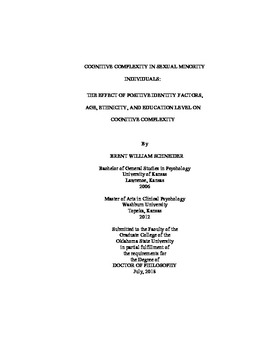| dc.contributor.advisor | Hammer, Tonya R. | |
| dc.contributor.author | Schneider, Brent William | |
| dc.date.accessioned | 2019-03-20T19:25:38Z | |
| dc.date.available | 2019-03-20T19:25:38Z | |
| dc.date.issued | 2018-07 | |
| dc.identifier.uri | https://hdl.handle.net/11244/317645 | |
| dc.description.abstract | Cognitive complexity is defined as a multidimensional way of looking at people and the world. Previous qualitative research has examined cognitive complexity in sexual minority individuals, suggesting that sexual minority individuals possess higher levels of cognitive complexity due to the activities and emotional events involved in their identity formation process. This assertion, however, has not been subjected to quantitative methodology in a sample other than self-identified lesbian participants. Using Mechanical Turk to recruit participants, 198 individuals were administered a demographics questionnaire, the Role Category Questionnaire, and the Lesbian, Gay, and Bisexual Positive Identity Measure or the Transgender Positive Identity Measure. Analyses reveal that belonging to an ethnic minority group decreases cognitive complexity. Additionally, indicating higher levels of community was also shown to decrease cognitive complexity, but having higher levels of social justice increased cognitive complexity. These findings suggest that groupthink may be a factor that serves to decrease cognitive complexity due to insulating individuals from examining alternatives or outside opinions of issues. Finally, clinical implications are suggested for counselors working with sexual minority individuals followed by limitations of the study and future directions for continued research on cognitive complexity in sexual minority individuals. | |
| dc.format | application/pdf | |
| dc.language | en_US | |
| dc.rights | Copyright is held by the author who has granted the Oklahoma State University Library the non-exclusive right to share this material in its institutional repository. Contact Digital Library Services at lib-dls@okstate.edu or 405-744-9161 for the permission policy on the use, reproduction or distribution of this material. | |
| dc.title | Cognitive complexity in sexual minority individuals: The effect of positive identity factors, age, ethnicity, and education level on cognitive complexity | |
| dc.contributor.committeeMember | Carlozzi, Alfred F. | |
| dc.contributor.committeeMember | Jacobs, Sue C. | |
| dc.contributor.committeeMember | Hubach, Randolph D. | |
| dc.contributor.committeeMember | Barnes, Laura L. B. | |
| osu.filename | Schneider_okstate_0664D_15850.pdf | |
| osu.accesstype | Open Access | |
| dc.type.genre | Dissertation | |
| dc.type.material | Text | |
| thesis.degree.discipline | Educational Psychology | |
| thesis.degree.grantor | Oklahoma State University | |
